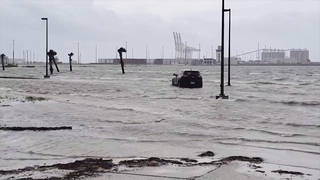
Topics
New Orleans resident Mike Howell discusses how the federal and state government, relief organizations and aid agencies betrayed the people of his city in the aftermath of hurricane Katrina. [includes rush transcript]
- Mike Howell, New Orleans resident.
Transcript
AMY GOODMAN: Around the corner, with Mike Howell, again, one of the holdouts of the French Quarter, we sat in his garden. He lives on Barracks, appropriately called. He and his wife, Angela, remain there. Mike talked about the seven betrayals.
MIKE HOWELL: What I can say is that they had — they called for mandatory evacuation, but they didn’t provide us with transportation out, alright? That’s ridiculous. Even the president of Jefferson Parish, who is by no means a screaming liberal — he’s a boll weevil Democrat, Aaron Broussard said, you know, “It would be hypocritical for me to order a mandatory evacuation if I don’t have the vehicles to get everybody out.” So they’ve always had voluntary evacuation, which is important, legally for the people here. You don’t have to live in terror of being thrown out. In New Orleans, the government here said we’re going to have a mandatory evacuation, alright? And yet they didn’t provide the transportation.
The day before the storm hit, I remember Mayor Nagin got on the radio and asked the churches, who have been useless in the city, in my opinion, with one exception, a Reverend Watson from one of the Pentecostal churches, to organize caravans out of the city. That’s ridiculous, alright? First of all, churches are not capable of doing this. They’re not capable of organizing mass transit of 150,000 people or 100,000 people without cars. We needed to have a state-organized transit out, like Cuba, alright? Like when they have their storms, they have a whole system in place to truck everybody out here. That’s the same thing we need here. We need — the government here needs to look at Cuba and how they handle the hurricanes, and how they have mass transit out. That’s betrayal number one, was this not providing the transportation out. And they knew. We have had bad storms before with Camille in 1965, and Betsy was 1969. They knew. This was 40 years in the making.
On top of this, though, betrayal number two was when they continued to push for the — betrayal number two, excuse me, was when for five days I did not hear, and I didn’t run into anybody who heard on the radio, that they were distributing emergency supplies of food, water, or medicine, alright? The French Quarter was dry. We had tree — wind damage, but I work in Jackson Square as a Tarot card reader, okay? And I know — I always go to Jackson Square, it gives me a feeling of security when I go. But anyways, they could have — from the Monday after Katrina hit, they could have put an emergency — for air drops, send marines in, and it would have been no problem setting up an emergency center for food and water.
They consciously did not do that. I have not gotten a good explanation as to why they didn’t do it, and not just — there were many other areas too, there was uptown in Algiers. They had dry areas, too. There has never been an explanation to me as to why there were no emergency food or water. Eventually we started getting it when the army came in. After the army came in, and you’d just run up to the people in the army and they might give you some food or some ice or water, very rarely ice, but food or water, but the police were in no position to give out emergency supplies the first three days because many of the police did not have enough food and water. That’s what they were telling me. And I had no doubt that they didn’t. So you had even a situation where the police had no food and water. The people didn’t know whether they were going to get food and water, and there was no announcement made, no real attempt made to the public to tell us where to get food and water.
The only thing — and this is betrayal number three, of the government here, was they told people after they left, in this period, the first five days after Katrina hit, to go down to the Superdome, and yet they did not have the resources to supply people with food, water, heat, and the Superdome was the last place — well, maybe other than the flood zone, was the last place people should have been going. You know, I have — know that people went without food, went without water. They were degraded, humiliated. It was unsanitary. I really believe in my heart of hearts they would have been better off if they would have just stayed in the dry areas of — like the French Quarter or Algiers or wherever they could get to. I think they would have been subject to a lot less abuse. I think maybe some more people would have survived.
But you know, on top of this incredible trauma of losing your home and losing all of your property and maybe losing loved ones, then you go off to this place called the Superdome and you’re not allowed to go out, from what I heard, and you are treated like animals. I mean, we were hearing that, as we were holdouts, as we’re called here. People, believe me, on the outside were hearing about this and it was horrifying, because we were supposed to be the next ones to go there. They were saying, “You have got to evacuate, you’ve got to evacuate.” So we were just waiting for that knock on the door, and we we’re saying, “Where are they going to send us?” Were they going to send to us the Superdome, Convention Center where they are not feeding them food, water, where they’re treating them like animals? Hell no, we don’t want to go there. And so, I think that that would be betrayal number three, would be that.
And betrayal number four — I mean, I could go on — that I can remember, betrayal number four was that they — the local government tenaciously and doggedly until maybe the last day or so insisted upon pushing through the mandatory evacuation policies. And at this point you could say, well, we’ve got — it took them like three or four days to bus people out of the Superdome. So we had a situation where they were still calling for mandatory evacuation, but they didn’t have the way to transport people out, but even if they did, by that point, the people in the dry areas could survive. All we needed was food or water. It would have been a lot less traumatic. So we went through day after day of people telling us, authorities, that “You have to leave. You are going to be forced out.” And okay, when that happens, that happens. We’ll wait for the knock on the door. But it’s like what can you say when you are waiting in your home, you have just survived the greatest natural catastrophe in the history of the country and you’re waiting for the police to knock on the door, bang it down with a battering ram. You know, it’s just — it’s psychological. So that’s betrayal number four was a campaign of psychological warfare against the people who were in New Orleans but outside the Superdome.
And betrayal number five, the — oh God, the Red Cross. I haven’t seen hide nor hair of them. I haven’t seen hide nor hair of FEMA. I haven’t seen hide nor hair of any of these non-profits. I will give the Salvation Army some credits. On September 6, they started delivering some hot dogs and some other stuff, which was — they’re the only ones that did it. Hey, I wasn’t there for that. Of course, I missed it. But now they have some food that I went and got yesterday. But other than the Salvation Army, they gave me two meals and a couple of sodas, we have gotten nothing. Other than the soldiers. Hey, hey, hey, we have got to like — you see those pictures of people in like the third world, you know, in Brazil or Africa running around after the soldiers, demanding that they throw them something? That’s what we did. We do the same thing. So that’s where we live.
I think that betrayal number five is that the federal — six — all right, six, is that the government just turned its back. The federal government just turned its back on us. Now, that might be better than what the city government — because the city government didn’t, and I don’t know which one is worse. The federal government turning its back on us, because being a person who is — do we call ourselves “holdouts” — you know, we probably prefer to not deal with the government at this point than be brutalized by it. So I mean, obviously, I don’t know what the Bush administration is doing. Obviously, they have screwed up totally, big-time. They should have gotten the food and water here. So that’s betrayal number six.
Betrayal number seven is they’re starting to make decisions about how to revitalize, restructure this country — excuse me, the city, without a public hearing. And I don’t think they should do that until they start having public hearings, until we start having people back in New Orleans.
AMY GOODMAN: Mike Howell, speaking in his garden in the French Quarter. He lives on Barracks and refuses to leave.













Media Options